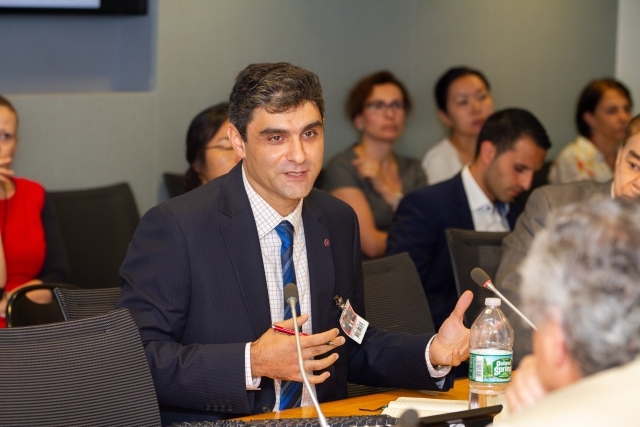
Associate Professor of Economics Aleksandr V. Gevorkyan, Ph.D., presents key findings from his recent book to a high-level audience at the World Bank on Oct. 3.
Associate Professor of Economics Aleksandr V. Gevorkyan, Ph.D., of The Peter J. Tobin College of Business presented findings of his recent study of post-socialist economies to an audience of policymakers, economists and other specialists at the headquarters of the World Bank in Washington on October 3.
Dr. Gevorkyan’s presentation, “Economic history, theory, & policy in the post-socialist transition,” extended the conclusions he reported in his latest book, “Transition Economies: Transformation, Development, and Society in Eastern Europe and the Former Soviet Union” (Routledge, 2018).
After giving an analytical overview of economic history, grounded in his scholarly research, Dr. Gevorkyan then guided the audience into a conversation on the emerging economic and social scenarios across the diversity of the countries often categorized as transition economies. The role of the state in the economic development process was a particular focus for the attendees. The engaging conversation touched on the need for a more informed policy that considers the objective history and reality of a particular country setting.
Frank Heemskerk, Executive Director for the Netherlands constituency at the Executive Board of the World Bank Group, chaired the event. Mr. Heemskerk, in his observations about Dr. Gevorkyan’s work, amplified the urgent questions posed in Dr. Gevorkyan’s book, particularly about the need for a clear direction in economic policy making in the case of transition economies and in general.
Hans Timmer, Chief Economist for Europe and Central Asia at the World Bank, in his role as discussant, emphasized Dr. Gevorkyan’s book’s unique contribution in multi-faceted historical analysis of the economic development across a range of countries in the Eastern European and former Soviet Union region. Mr. Timmer also stressed the importance of non-technical and social factors in development and macroeconomic policy making, which is relevant to the World Bank’s efforts today, a point that Dr. Gevorkyan amplified in his masterful text.
Dr. Otaviano Canuto, Executive Director for the Brazil constituency at the Executive Board of the World Bank Group, added to the conversation with his observations from his recent trip to some post-socialist countries, emphasizing a diversity of socio-economic outcomes, which he found also reflected in Dr. Gevorkyan’s book.
The floor then was opened to a general discussion with economists and specialists from the World Bank and the International Monetary Fund present at the event or joining online, raising interesting questions and contributing their feedback on the main presentation.
The full video of Dr. Gevorkyan’s presentation can be viewed at https://youtu.be/DTeI5mYGV5I. The views expressed during the discussion and in the video segment are those of the respective speakers and do not represent those of the organizations with which the speakers are affiliated.
Related News
Vincentian and Grad Student Hopes to Use His Education to Elevate Those in His Native Country
Rev. Haile Suba Weldegiorgis, C.M., is not your typical business student. Nor is he your typical priest. But the 36-year-old native of Ethiopia is, in fact, both—an international student attending...
Former FTC Chair Engages with Students at St. John’s Henry George Lecture
The youngest-ever Chair of the Federal Trade Commission (FTC) brought her economic wisdom and public policy experience to St. John’s University on February 5, speaking to a gathering of students...
Insurance Leader of the Year Dinner Raises $3.6M for GSRM Students
A global gathering of aspiring students, insurance industry executives, and other supporters of the Greenberg School of Risk Management, Insurance and Actuarial Science (GSRM)—part of The Peter J...
